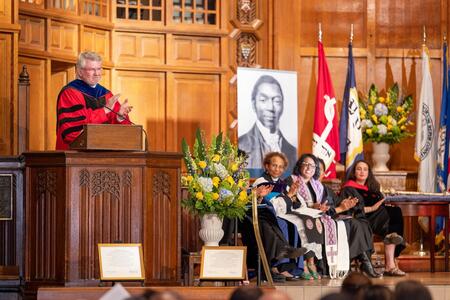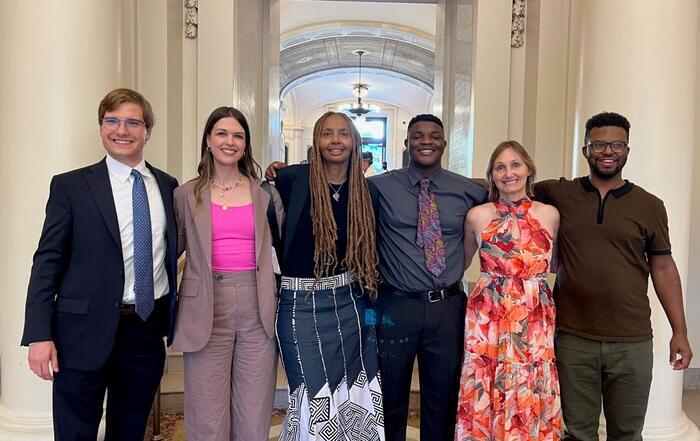“We have started the long and challenging process of reconciliation.”
So declared YDS Dean Greg Sterling before a large crowd in Yale’s Battell Chapel on Sept. 14 as the YDS and Yale communities gathered to celebrate and confer degrees upon the Rev. James Pennington ’23 M.A.H. and the Rev. Alexander Crummell ’23 M.A.H.—two men who studied at YDS in the 1830s and 1840s but were barred from officially enrolling because of their race.
 Preceding Sterling, Yale President Peter Salovey apologized for Pennington’s and Crummell’s exclusion from official student status and the opportunity to earn degrees.
Preceding Sterling, Yale President Peter Salovey apologized for Pennington’s and Crummell’s exclusion from official student status and the opportunity to earn degrees.
In addition to being barred from matriculating, the two men—who both went on to accomplished careers as ministers and racial justice advocates—were not permitted to speak in class or check out library books.
Sterling thanked the President for his courage in acknowledging the injustice perpetrated by Yale and the theological seminary, as it was then known. “Today,” Sterling said, “is the first time that a Yale President has apologized for past discrimination.”
“A first step is not a final step,” Sterling continued. “But it is a beginning. … I hope that as we move forward as a community we will work with the same spirit that permeates this hall today. If we do so we can begin to heal the wounds created by America’s original sin (of racism) and Yale’s original sin.”
‘They were men of Yale’: Read full coverage at Yale News.
Sterling hailed students from YDS and around the university for their tireless advocacy for the posthumous awarding of a degree to Pennington. Sustained applause broke out when Sterling asked the students to stand and be recognized.
Speakers at the ceremony included Noah Humphrey ’23 M.Div., who was a leader in the student advocacy campaign, and Ellen VanDyke Bell ’24 M.A.R., who was a member of the Pennington Legacy Group. During part of the ceremony, they and two other Yale students took turns reciting passages from writings by the two honorees.
“The following reflections come from the writings of Reverends Pennington and Crummell,” Bell said as she introduced the readings. “Although they were not permitted to speak in class when they studied here, they will be heard on this campus today.”
